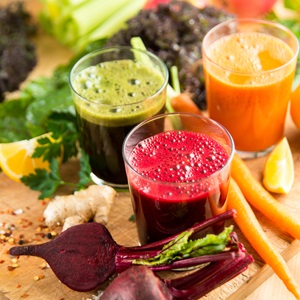Juicing is a worldwide trend with juice bars everywhere. Juice cleanses and detoxes are all the rage while some say they are a dangerous fad. Store-bought juice is no good. Simple orange juice won’t suffice either. We want new and interesting concoctions – powerhouses of nutrients.
Nutritional therapy
Considering that body tissues are constantly regenerating, it’s not hard to believe that boosting ones’ immune system could help reverse autoimmune disease. If one were to try a complex nutritional therapy to cure a disease, one would need more than the recommended daily allowance of 5 portions of fruit and veg per day; one would need to digest a mountain of fresh produce. A more effective way would be to juice it. But let’s face it; nutritional therapy is not the juicing goal for most people.
The average juice consumer
While some disciplined beings fit it into their healthy lifestyles, the rest of us are just happy to chug a juice as a quick-fix. That’s where the so-called danger may lie; your regular juice could lead to problems.
The dangers of juicing:
1. Less fibre
A juicer separates the juice from the fibrous pith, peel, core, and pips. These pulpy bits (often discarded,) contain the fibre, vital for your digestive system. Constipation, resulting from missing fibre can lead to piles or hernia.
Solution: Get enough fibre from other sources.
2. Acid content
Although fruit and veg typically have an alkalising effect on the body, some fruits contain high amounts of citric acid, which may irritate the sensitive lining of the stomach, leading to pain, and sickness.
Solution: Go easy on acidic fruit, and juice more veggies instead.
3. Fewer nutrients
Antioxidants break down and oxidise as soon as fresh produce is cut and processed; especially at high speeds as with a centrifugal juicer or blender. Enzymes deteriorate even more when juice stands for a while.
Solution: Use a slow, masticating juicer, and drink your juice immediately.
4. Bacteria
Owners of juicers will know how difficult cleaning is. If a juicer isn’t cleaned properly, it can become a breeding ground for germs.
Solution: Clean your juicer according to the manufacturer’s instructions as soon as you’ve finished juicing.
5. Sugar and diabetes
Few people would eat four oranges in one sitting. A standard glass of orange juice contains the juice and sugar of four oranges, but with very little fibre.
Fructose, contained within the cells of the fruit, is slowly broken down during digestion when eating whole fruit. By crushing fruit, the fructose is released immediately. While you aren’t creating more sugar by crushing the fruit, you’re making it much easier for your body to absorb.
To regulate the increased sugar levels, the body releases the hormone insulin. This creates an ‘insulin spike’, which means you need to burn off the sugar by exercising or it will be stored as fat. Once that sugar-high wears off, you’ll experience a sugar crash and feel hungry again.
If you continue raising blood sugar like this over a long period of time, you may become insulin resistant (cells stop responding to the hormone.) This is a pre-diabetic state, which increases your risk of developing type 2 diabetes.
Solution: Cut your risk by juicing more veg and less fruit, and following a healthy diet and exercise program.
6. Weight-gain
Food stays in the stomach for hours while it’s being broken down; keeping you feeling full. When you chew, you produce saliva, which contains an enzyme, which helps the body recognise that it’s full. If you chug five pieces of fruit in liquid form, you are bypassing many necessary and complex processes, which may result in overeating.
Your body burns up to 200 calories a day chewing, absorbing, processing, and breaking down food during the thermic effect. By consuming your calories in juice form, your body has less work to do; you’re missing out on burning 200 calories!
Solution: Replace some juice with whole fruit and veg.
What about blending?
Blenders, unlike juicers, crush everything, including the fibre. It’s still not as good as eating the whole fruit because even if you use the entire fruit, the blades in your blender will break down and reduce the natural form of the fibre.
Conclusion
If it’s the only way to make up your five-a-day, then drink a small glass of fruit juice. Otherwise, simply eat a healthy diet full of fruit and vegetables.
Tell us your juicing wonders and woes
Source: Mail Online

